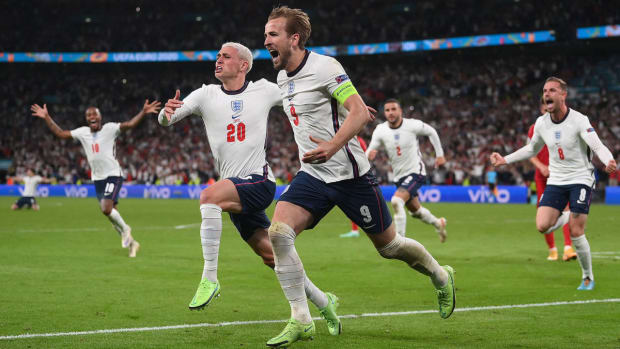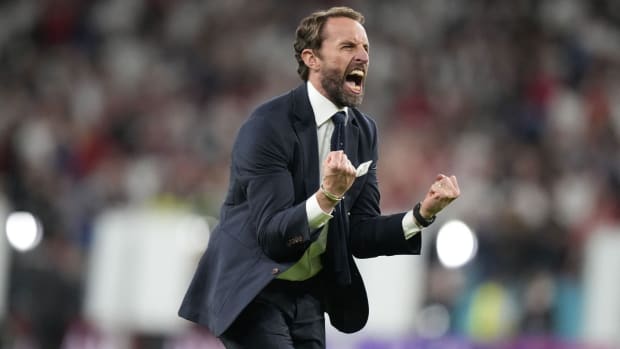The pivotal moment was a controversial one, but the scales of a one-sided semifinal had tipped heavily in England's favor throughout, and it'll face Italy in the final.
LONDON — Major semifinals are usually not lacking for subplots, and this one was no different. In the end, Denmark's fairytale fell short of a final chapter. The wave of emotion it has ridden since Christian Eriksen suffered his cardiac arrest in its opening game at Euro 2020 wound up being no match for the redemption narrative of Gareth Southgate. Some 25 years ago, at Wembley Stadium, Southgate missed the vital penalty in the shootout of the Euro 96 semifinal against Germany. Wednesday, he managed his nation into its first major final since the 1966 World Cup thanks to a 104th-minute winner scored by Harry Kane from a rebound off his missed penalty.
Perhaps the awarding of the decisive penalty was soft. Perhaps Joakim Maehle did not clip Raheem Sterling, and perhaps the upper body contact from Mathias Jensen was enough. But if you run at defenders enough, if you put in enough crosses, eventually mistakes are made and opportunities arise. England won, 2–1, because of the hour of extraordinary pressure to which it subjected Denmark between the start of the second half and the end of the first half of extra time.

Danish goalkeeper Kasper Schmeichel’s prematch press conference brought the inevitable question: what would it mean to Denmark’s players if they could stop "it" from "coming home?" Schmeichel’s response was to ask if it—a general reference to a title but in this case a Euro title, which England has never won—had ever been home. It was seen as some great burn, when it was actually a pretty fair representation of what the song is about, if you consider the verses rather than just the more straightforward repetition of the two choruses.
Even that chorus, in the context of the time, is far more ambiguous than it may seem when brayed out by a couple of hundred drunken fans in some corner of a foreign town square. “It’s coming home,” in 1996, referred not necessarily to winning the Euros but to the tournament being staged in England. It captured the new mood of hope and togetherness of the tournament. After all the years of hooliganism and tragedy, this was England trusted once again to host a tournament.

The verses are not triumphalist. Rather they celebrate a series of moments—the “tackle by [Bobby] Moore,” (on Pelé at the 1970 World Cup); “When [Gary] Lineker scored” (to equalize against West Germany in 1990); “Nobby [Stiles] dancing” (after winning the World Cup in 1966); “Bobby [Charlton] belting the ball” (to score against Portugal in the 1966 semifinal)—and then focus on England’s tendency to “throw it away,” on the “jokes” and the “sneers” on the “oh-so-nears.” It’s a song about failure and poignancy and how that doesn’t really matter; what matters are those moments everybody remembers, whether of success or failure, that bind communities together through their presence in the collective consciousness. David Baddiel, who co-wrote the song and was at Wembley on Wednesday with the other writer, Frank Skinner, spoke of it celebrating “a vulnerable patriotism.”
Euro 96 provided more of those memories—Paul Gascoigne’s goal against Scotland, Teddy Sheringham’s disguised pass for the third against the Netherlands—and also the oh-so-nears: Gascoigne stretching and not quite getting to Alan Shearer’s cross in the semifinal. The World Cup two years later offered the Argentina game with Michael Owen’s brilliant goal, David Beckham’s red card, Sol Campbell’s disallowed header and another penalty shootout defeat.
Since then it's been … well, nothing, really. Wayne Rooney flickered at Euro 2004, and the quarterfinal defeat to Portugal was extraordinarily dramatic, but that aside, England’s appearances at major tournaments had been almost entirely unmemorable, at least for England fans who don’t take a masochistic delight in Rooney’s red card against Portugal in 2006, Andrea Pirlo’s Panenka in the penalty shootout in 2012 or the debacle against Iceland five years ago. England turned up (most of the time) at major tournaments, played dismally and went home unmourned. If Southgate has done nothing else, between this run to the final and a place at the 2018 World Cup semis, he has at least made England interesting again.

Wednesday's semifinal was at least a game of ups and downs, and then that one great surge, the likes of which England has not produced in a major tournament since Euro 96. Having begun well, England suddenly suffered a quarter of an hour of panic as Denmark began to press, at the end of which Mikkel Damsgaard whipped home the first free-kick goal of the tournament—and England's first concession in the competition. Behind for the first time at the Euros, England, already twitchy, could have panicked, but instead it came back at Denmark hard, with Kane and Bukayo Saka combining twice in quick succession to set up Sterling, who was a force throughout. Schmeichel blocked the first point-blank effort; the second was bundled into his own net by Simon Kjaer before Saka's cross could reach Sterling, a staggering 11th own goal of this tournament.
There was another second-half save from Schmeichel, extending fully to his right to claw away Harry Maguire’s header. That could have been another oh-so-near. There were countless other chances and half-chances and glimpses of chances. And then came the penalty, one that will be a tough moment to accept for a valiant Denmark side that appeared down to its last legs. Kane’s effort was saved by Schmeichel, but the ball rebounded kindly for him and he swept it into the empty net. An own-goal and the rebound from a penalty? They're not the greatest memories perhaps, but they’ll do. They definitely bound the partisan crowd of over 60,000 at Wembley together, and countless others watching outside the stadium.
Only Italy in Sunday’s final stands in the way of Southgate’s ultimate redemption and England's first title in 55 years. Perhaps, this time, it really is coming home.
More Euro 2020 Coverage: